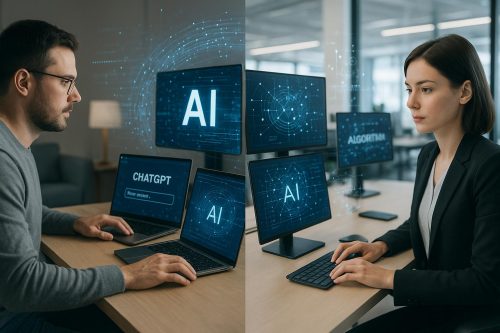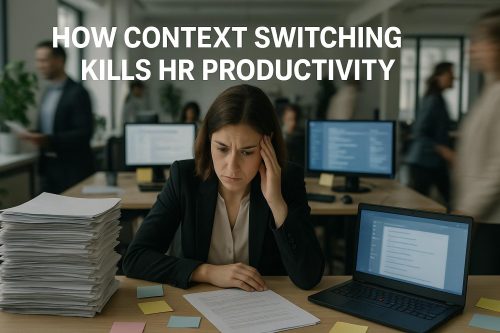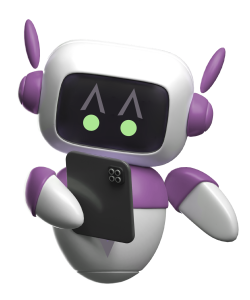The whispers are everywhere. Business as we know it is getting a significant makeover, thanks to AI. The days of traditional HR are numbered – today’s pros must quickly adapt to an AI-driven landscape and seize the opportunities it presents.
Don’t believe the hype – robots aren’t here to steal your paycheck. Picture this: AI agents tackle tedious tasks, allowing your team to focus on high-leverage work, resulting in a boost to overall productivity. Now, HR teams are no longer weighed down by tedious administrative work, allowing them to operate at a more meaningful level.
 Start by anticipating how these agents will interact with your system, and then take steps to facilitate a smooth integration.
Business as usual is about to get a serious upgrade as firms gear up to unleash AI agents on a wide range of industries. Over 80% of major firms intend to deploy AI agents soon. AI agents are rewriting the prep playbook, and we need to adapt fast. With customer loyalty hanging in the balance, companies are working overtime to up the ante to ensure the supply chain runs smoothly, and the customer experience is optimized.
Start by anticipating how these agents will interact with your system, and then take steps to facilitate a smooth integration.
Business as usual is about to get a serious upgrade as firms gear up to unleash AI agents on a wide range of industries. Over 80% of major firms intend to deploy AI agents soon. AI agents are rewriting the prep playbook, and we need to adapt fast. With customer loyalty hanging in the balance, companies are working overtime to up the ante to ensure the supply chain runs smoothly, and the customer experience is optimized.
Understanding AI Agents
AI agents are more sophisticated than simple chatbots. Imagine a self-directed powerhouse that sucks in data, analyzes it quickly, and then makes sharp moves to get the job done – without so much as a nod from a human operator. Gone are the days of slaving away for hours; these digital sidekicks can tackle those tasks in no time. An AI agent automates repetitive tasks that are dynamic. Better decisions happen when you’re armed with the right data – and that’s exactly what this does. Natural language processing and machine learning enable AI agents to understand context and user requests. But, to prepare for AI Agents, we need to understand more about them.Types of AI Agents
AI agents vary in complexity:- Reactive Agents: These basic agents respond to immediate inputs without memory. Chatbots and spam filters are their comfort zone – environments where rules are set in stone and expectations are clear-cut.
- Task-Specialized Agents: These agents handle specific activities like fraud detection or medical imaging analysis. Imagine HR teams unshackled from drudgery, given the room to think critically and creatively about how to propel their organization ahead. Imagine an intel ninja, swiftly scouring through raw data, leveraging machine learning know-how to craft responses that truly pack a punch.
- Context-Aware Agents: More complex than reactive or task-specialized agents, these consider the “bigger picture.” They use reinforcement learning and handle more varied situations by analyzing user inputs along with relevant information. Because they’re so finely attuned, they can nail down even the most elusive issues.
- Socially Savvy Agents: These agents interpret human emotions and intentions. Imagine AI understanding an employee’s tone of voice or email, detecting stress or uncertainty. With a bit of compassion and understanding, HR can better handle tricky situations and create customers for life. AI agents for customer service wouldn’t be the same without them – they’re the game-changers behind the scenes.
To prepare for AI agents requires some serious planning.
 Start by anticipating how these agents will interact with your system, and then take steps to facilitate a smooth integration.
Business as usual is about to get a serious upgrade as firms gear up to unleash AI agents on a wide range of industries. Over 80% of major firms intend to deploy AI agents soon. AI agents are rewriting the prep playbook, and we need to adapt fast. With customer loyalty hanging in the balance, companies are working overtime to up the ante to ensure the supply chain runs smoothly, and the customer experience is optimized.
Start by anticipating how these agents will interact with your system, and then take steps to facilitate a smooth integration.
Business as usual is about to get a serious upgrade as firms gear up to unleash AI agents on a wide range of industries. Over 80% of major firms intend to deploy AI agents soon. AI agents are rewriting the prep playbook, and we need to adapt fast. With customer loyalty hanging in the balance, companies are working overtime to up the ante to ensure the supply chain runs smoothly, and the customer experience is optimized.
Upskilling and Reskilling
HR should focus on technical skills and uniquely human skills. Whether it’s data analysis or problem-solving, workers who effectively prepare for AI Agents, and understand how AI Agents work stand a better chance of staying ahead of the curve.| Focus Area | Example Skills |
|---|---|
| Technical Proficiency | AI programming, data analysis, prompt engineering |
| Critical Thinking & Problem-Solving | Cognitive flexibility, complex decision-making |
| Emotional Intelligence | Interpersonal communication, empathy, relationship building |
Adapting Workflow
AI changes how HR handles recruitment, training, and employee relations. picture this: customers get swift, accurate answers while agents tackle the heavy lifting – it’s all possible with AI-driven service solutions. Data labeling is the ace up HR’s sleeve when it comes to training AI, so it’s crucial to get it right. To get AI working at its best, accuracy and efficiency are must-haves. This is how AI processes will greatly help in automations training.- Reimagine processes: Evaluate tasks suitable for automation, like resume screening or scheduling interviews. By offloading routine tasks, HR professionals can now turn their attention to the big picture.
- Collaborative AI usage: Train staff to work with AI, viewing AI as allies to maximize benefits.
- Leverage AI insights: Analyze employee data and identify performance patterns to make informed workforce decisions proactively.
Embrace Continuous Learning
The AI field is rapidly evolving, and more companies are building AI Agents that can help us reduce our workload. To stay ahead of the AI curve, knowledge is power. Mastering AI agent creation is a progressively refined skill that evolves with each new experience. In today’s fast-paced business environment, AI training is no longer a luxury, it’s a necessity. Suddenly, businesses are equipped to supersede manual legacy systems, seamlessly routing customers to resourceful support reps, and automatically rerouting shipments to avoid bottlenecks – thanks to the forward-thinking might of AI.-
- Seek regular AI training. Want to be an AI insider up on AI systems and platforms, including generative AI? Start by tapping into trusted sources, circling key dates on the conference calendar, and getting into the nitty-gritty of research reports. With a clear view of what’s driving results, HR can distill best practices down to their essence, replicating what works and ditching what doesn’t.
- Promote internal knowledge sharing within the team. AI is moving fast, but with this, everyone’s stay ahead of the curve. The more a company invests in the knowledge growth of their teams in learning about Artificial Intelligence, the greater a return they are likely to see in employee satisfaction.
The Future of HR with AI Agents
Businesses are rushing to build AI agents. HR can incorporate and prepare for these changes. More than 60% of business owners see AI Agents’ potential to improve relationships and enhance work relationships. One promising finding is that AI has serious potential to transform the workplace. Business leaders widely report a surprising yet welcome side effect of AI adoption: improved internal communication and more efficient workflows.For example, integrating sentiment analysis into communication can uncover hidden stress among teams, and provide a clear picture of the team members who aren’t feeling valued or satisfied, and need some targeted help to turn things around.
With AI agents, companies can turn their attention to building a more cohesive team by revamping their internal programs. The positive impact will be palpable – communication will blossom, and the team’s collective performance will begin to soar to unprecedented heights. Adapting to AI agents can allow employees to understand and embrace the process. They will learn how to prepare for AI Agents as management provides guidance.FAQs about how to prepare for AI Agents
How do I prepare for AI Agents?
As AI changes the game, it’s time to level up your skills – learn to think outside the box, solve the unsolvable, and unleash your creative genius. New tech knows no age, no matter how seasoned you are, so gear up and get ahead by devoting time to discovering what’s new and what’s next. With AI evolving at lightning speed, you’ll have the skills to adapt and thrive in this fast-paced landscape. Learning to generate human language from AI will become a necessary skill.Behind every skilled AI agent is a story of trial, error, and perseverance – so what’s the secret to getting it right?
Training AI agents involves feeding them large amounts of data. It’s like turning on a flashlight in a dark room – they start to see what they need to do to achieve their goals. First, you establish clear objectives, then get your data in order, slap some labels on it, and finally, machine learning algorithms and rigorous testing enter the picture. Refinement, including tuning large language models (LLMs), and monitoring keeps agent actions aligned with outcomes. Who says data labeling has to be a grind? With the right agent-building tools, you can speed through the task and get on with the good stuff.Preparing for AI’s bold leap forward isn’t an act of fear; it’s a pledge to remain relevant. Even small-step upgrades in awareness and adaptation today can define the battlegrounds of tomorrow.
The complete AI takeover is mainly a science fiction concept. Harness the power of AI for specific tasks to free up your time and energy, so you can tackle the things that really matter. It’s similar to the computer revolution decades ago. Understanding what an ai agent involves in terms of training data will alleviate some concerns.What are the main four rules for an AI agent?
While formal “rules” are still evolving, four principles guide AI agent development. Take away questionable data and watch AI agents thrive – data labeling is the unsung hero here. Autonomous AI agents handle complex tasks without human intervention. An autonomous agent can efficiently answer customer inquiries. This leads to painfully slow response times that leave you twiddling your thumbs.- Goal Optimization: Agents strive to achieve given goals.
- Real-World Grounding: Agents interact with and respond to data about their environment.
- Continuous Learning: Agents adapt and improve over time with new inputs.
- Safe & Ethical Operation: Development aligns with safe use, privacy, and societal well-being.





